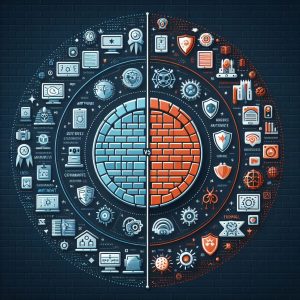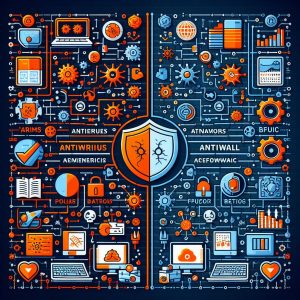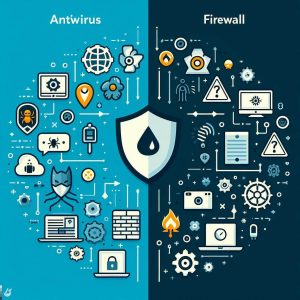With cyberattacks constantly evolving, using layered security solutions is essential for defending endpoints and networks. Two cornerstones of cyber protection are antivirus software and firewalls. While both are vital, they serve distinct purposes. This guide will compare antivirus tools and firewalls, examine how they complement each other, and highlight key considerations for implementation.
What is a Firewall?
A firewall is a network security system that monitors and controls incoming and outgoing traffic based on a defined set of security rules. Firewalls act as a barrier between trusted internal networks and untrusted external networks like the internet.
They work by inspecting traffic against predetermined criteria to block or allow access. Corporate firewalls shield private networks while personal firewalls protect individual devices.
Types of Firewalls
Network firewalls – Appliance hardware installed at network perimeters with OS/software to inspect traffic across entire networks.
Host-based firewalls – Software installed on endpoints like computers that screens network activity on that device only.
Cloud firewalls – Firewall resources provisioned from cloud providers to protect infrastructure and applications in the cloud.
Firewall Advantages
- Shield entire networks or devices from untrusted access
- Allow granular control over inbound and outbound traffic
- Prevent unauthorized access to private networks and machines
- Detect and block malicious traffic based on protocols, IPs, domains etc.
- Essential boundary protection aligned to security policy
Firewall Limitations
- Cannot directly detect or remove malware already present internally
- Require expertise to properly configure rules and policies
- Not designed to identify deceptive or encrypted threats
- Hardware models can be expensive and complex to deploy
What is Antivirus Software?
Antivirus software is an application installed on individual computers, servers, or mobile devices that monitors activity for malicious code and protects against cyber threats. It serves as the last line of defense against malware reaching endpoints.
Signature-based detection and heuristic analysis identify threats like viruses, worms, spyware, ransomware, and trojans. Real-time scanning proactively blocks execution and quarantines detected malware.
How Antivirus Software Works
- Scans files, memory, boot records, downloads, attachments etc. against databases of malware signatures
- Uses heuristics including behaviors, code analysis, and machine learning to detect unknown threats
- Quarantines or removes detected malware to contain and remediate threats
- Provides real-time monitoring and scheduled scanning to find infections
- Alerts users of detections and may block risky actions like accessing infected sites
Antivirus Software Advantages
- Detects and blocks known and unknown malware on endpoints
- Identifies and quarantines infected files/applications
- Prevents malware from harming host computers and networks
- Provides visibility into threats targeting users and assets
- Can integrate with other endpoint protection like firewalls
Antivirus Software Limitations
- Cannot assess full traffic like a network firewall can
- Requires frequent signature updates to keep pace with new threats
- Performance impact during scans and overhead while running
- Malware can evade detection through deception and encryption
- Only focused on the local endpoint environment
Key Differences Between Antivirus and Firewall
| Category | Antivirus | Firewall |
|---|---|---|
| Type | Software application | Hardware appliance or software program |
| Scope | Individual devices/endpoints | Entire networks or systems |
| Approach | Analyze files, memory, downloads etc. for malware | Filter traffic based on protocols, ports, IP addresses |
| Focus | Internal threat detection and response | External threat prevention |
| Strength | Identifying and remediating infections | Defining and enforcing access rules |
| Limitations | Limited view of networks/traffic | Cannot remove infections directly |
While both are vital for protection, antivirus and firewalls serve distinct roles:
- Firewalls control traffic flows between networks while antivirus monitors endpoint activity
- Firewalls prevent unknown external threats while antivirus catches internal infections
- Firewalls filter traffic but cannot see encrypted content like antivirus can
- Antivirus requires signature updates while firewalls rely on preset rules/policies
- Firewalls provide boundary restrictions while antivirus gives visibility into impacted systems
Using Antivirus and Firewall Together
Antivirus and firewall should be used together for layered security:
- Firewalls block risky traffic, creating the first barrier of defense
- Any threats that penetrate the firewall are caught by antivirus programs on endpoints
- Antivirus can inform firewall rules by identifying attack sources
- Firewalls prevent external communication with infected machines during remediation
A firewall cannot stand in for antivirus, and antivirus cannot provide total network security. Using both solutions together provides breadth and depth to catch threats both outside and inside your environment.

Key Takeaways on Antivirus vs Firewalls
- Firewalls filter traffic while antivirus inspects files/activity for malware
- Firewalls provide boundary control while antivirus delivers internal threat visibility
- Firewalls block based on protocols while antivirus uses signatures and heuristics
- Both are essential — firewalls keeping threats out while antivirus removes infections internally
- Layered security requires leveraging firewalls and antivirus together for comprehensive protection
For robust cyber defense, firewalls and antivirus solutions should be deployed together to block and detect threats across networks and endpoints. Their combined strengths produce overlapped protection to catch malicious activity.

